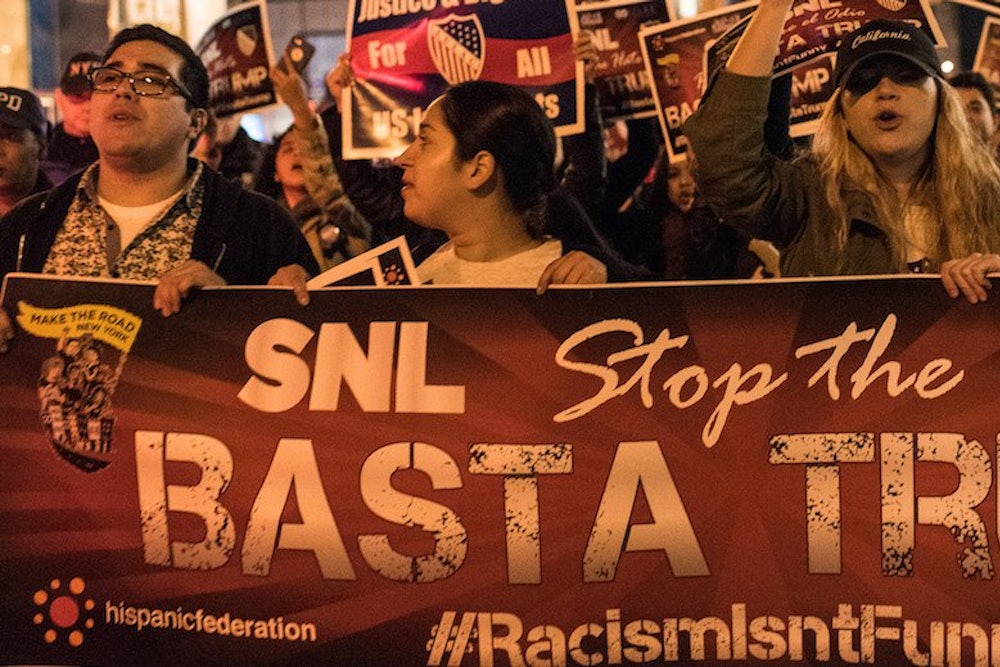Despite a week of protests, or perhaps because of them, around nine million people watched Donald Trump host an unfunny, unremarkable episode of Saturday Night Live this weekend. According to Variety’s calculations, Trump was on-screen for all of 12 minutes in what wound up being the highest-rated SNL in four years. He played himself as president. He played a laser harp. He tried really hard to look silly dancing. “This is what the protesters were worried about?” asked the New York Post, apparently disappointed that Trump didn't live up to his reputation as a borish xenophobe.
Mr. Trump promised that tonight would be special. #SNL pic.twitter.com/ol6hPwXKRv
— Saturday Night Live (@nbcsnl) November 8, 2015But people who tuned in to SNL expecting to see Trump do or say something outlandish miss the danger of Trump being invited to the show. The 200 protesters who marched from Trump Tower to NBC studios Saturday night—and the more than 500,000 people who signed a petition in support of the demonstration—did so not because they were worried Trump would have another "murderers, drug dealears, rapists" moment, but because they knew he wouldn’t. As Alex Nogales, president and CEO of the National Hispanic Media Coalition, told the Huffington Post, appearing on a mainstream pop-culture platform makes Trump “look like a respectable, legitimate, non-racist.”
This was precisely the conceit of the few barbs SNL directed Trump’s way: Trump can’t be an actual racist, because what kind of racist appears on a show to have his racism laughed at? As a candidate, Trump’s larger-than-life performance of white virility has always bordered on parody. Taking the act to SNL was just his way of signaling to a different audience that he’s in on the joke, too.
The daily exercise of structural racism in American politics depends on this contrast with flamboyant, almost comical bigotry. As overt expressions of racial animosity become less socially acceptable, their continued existence provides the premise for the charade of principle-based support for policies that just happen to disadvantage and harm minorities and principle-based opposition to policies intended to benefit them. Here’s how Lee Atwater, an influential architect of the Republican Party's political successes in the 1980s, explained the Southern Strategy in 1981:
You start out in 1954 by saying, “Nigger, nigger, nigger.” By 1968 you can’t say “nigger”—that hurts you, backfires. So you say stuff like, uh, forced busing, states’ rights, and all that stuff, and you’re getting so abstract. Now, you’re talking about cutting taxes, and all these things you’re talking about are totally economic things and a byproduct of them is, blacks get hurt worse than whites. … “We want to cut this,” is much more abstract than even the busing thing, uh, and a hell of a lot more abstract than “Nigger, nigger.”
It took decades for the Republican Party to become fully fluent in the vocabulary of coded racism. But with George Wallace, the segregationist Alabama governor, there to play the role of cartoonish prejudice, Richard Nixon was able to win over an entirely new voting bloc--the previously democratic South--in a single election, with his "law and order" rhetoric giving more subtle voice to the same "silent majority" anxieties about the counterculture and civil rights movements. Similarly, while immigration has been steadily creeping into the broader Republican discourse surrounding issues like health care, crime, and education since the 1980s, the overwrought anti-Latino sentiment of Donald Trump's early campaign allows other candidates--and even Trump himself--to make comparitively serious, level-headed political appeals to weaponized racism.
Loud, theatrical xenophobia is the reason Trump stands front and center on the Republican debate stages. But while his comments about Latino rapists and murderers spilling over the border got Trump heckled off of NBC's The Apprentice, his talk of “enforcing the border” is well within the confines of what is politically acceptable for liberal sketch comedy. So don’t be surprised if there aren’t any racist outbursts at Tuesday’s debate, from Trump or anyone else in the cast. They’re still delivering the same lines, it’s just the wording of the script that’s changed.
